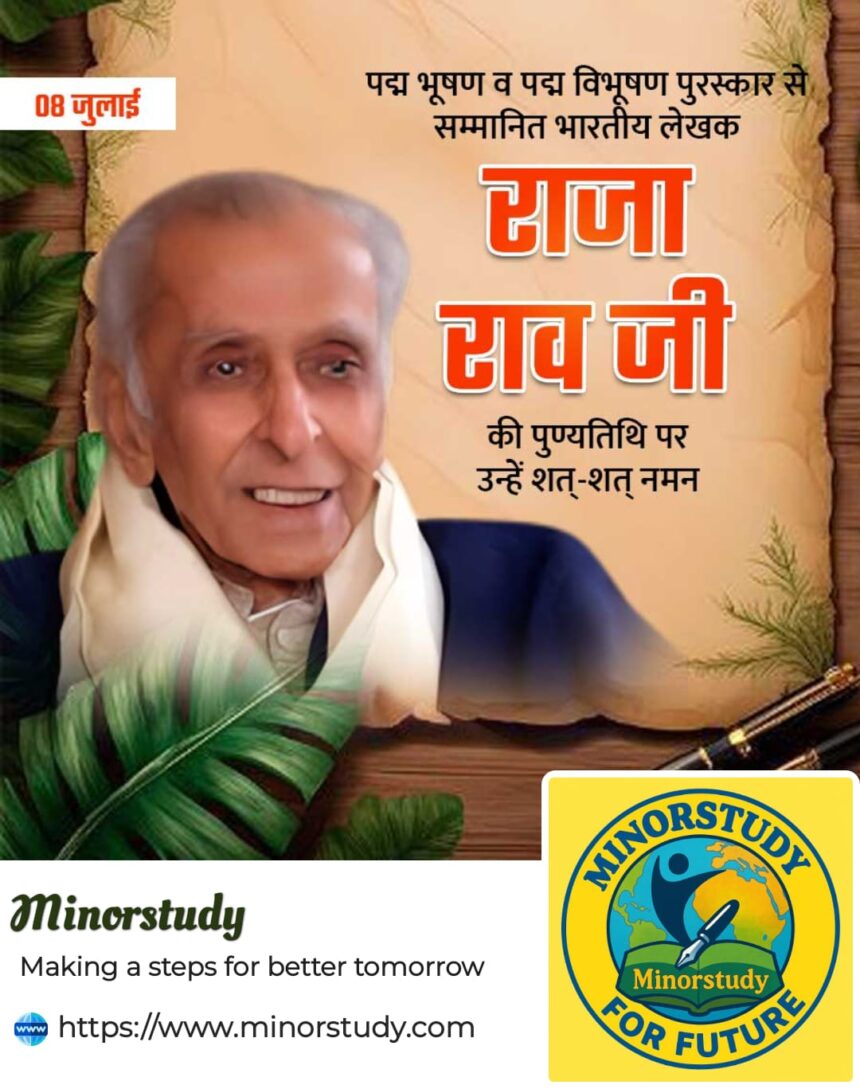7 Powerful Reasons Why Raja Rao Ji Legacy Still Echoes Through Indian Literature
Raja Rao Ji is one of the most celebrated literary giants of Indian English literature, whose philosophical insights, cultural depth, and narrative mastery transformed the global perception of Indian storytelling. His legacy is not merely literary; it is spiritual, philosophical, and nationalistic. Through his work, Rao Ji crafted an indelible bridge between the East and the West, showing how the Indian ethos could thrive in English words.
- 🌟 History of Raja Rao Ji: The Sage with a Pen
- 📌 Important Facts about Raja Rao Ji
- 📚 Timeline of Raja Rao Ji’s Life and Works
- 📖 Major Works That Define His Legacy
- ❓ FAQs about Raja Rao Ji
- Q1: Why did Raja Rao write in English instead of regional languages?
- Q2: Was Raja Rao influenced by Indian spirituality?
- Q3: Is Kanthapura based on real events?
- Q4: What sets him apart from other Indian English writers?
- 🕊️ Significance of Raja Rao Ji in Literature and Society
- 🙏 Wishing and Honoring Raja Rao Ji
- 💡 Importance in Our Life and Modern Society
- ✅ Conclusion: Daily Life Impact of Raja Rao Ji Teachings
- 📢 Key Takeaways
In this comprehensive article, we’ll explore his history, contributions, timeline, major facts, FAQs, significance, and the daily life impact of his philosophy, all while understanding why his words continue to reverberate across time.
🌟 History of Raja Rao Ji: The Sage with a Pen
Born on 8 November 1908, in the quaint town of Hassan, in the princely state of Mysore (present-day Karnataka), Raja Rao Ji hailed from an orthodox Brahmin family. Deeply rooted in Indian traditions, Rao’s exposure to Sanskrit literature, Upanishads, and Vedanta philosophy shaped the spiritual undertones of his writing.
After his early education in India, he pursued further studies in France at the University of Montpellier and the Sorbonne in Paris, where he delved into literature and metaphysics. Despite writing in English, his soul remained deeply connected with Indian thought systems.
📌 Important Facts about Raja Rao Ji
Language Pioneer: Though an Indian by birth, he chose English as his literary language, bringing Indian philosophy to a global platform.
Spiritual Fusion: His work merges Vedantic spirituality with modern narrative form.
Influence of Gandhiji: Raja Rao was a great admirer of Mahatma Gandhi, which reflected in his novel Kanthapura.
Awarded Padma Bhushan & Padma Vibhushan: Honored in 1969 and 2007 respectively by the Government of India.
Sahitya Akademi Award Winner: Received India’s highest literary honor in 1964 for The Serpent and the Rope.
Lived and taught in the USA: He was a professor of Philosophy at the University of Texas, Austin.
Died on 8 July 2006: He left his body in Austin, Texas, but his soul lives through his books.
📚 Timeline of Raja Rao Ji’s Life and Works
| Year | Event |
|---|---|
| 1908 | Born in Hassan, Karnataka |
| 1931 | Moved to France for higher education |
| 1938 | Published Kanthapura – a Gandhian novel |
| 1960 | Released The Serpent and the Rope, a metaphysical novel |
| 1964 | Received Sahitya Akademi Award |
| 1969 | Awarded Padma Bhushan |
| 1988 | Published The Chessmaster and His Moves |
| 2007 | Posthumously awarded Padma Vibhushan |
| 2006 | Passed away in Texas, USA |
📖 Major Works That Define His Legacy
Kanthapura (1938) – A political-spiritual tale on India’s independence struggle in a South Indian village.
The Serpent and the Rope (1960) – A philosophical exploration of self and reality, often considered autobiographical.
The Cat and Shakespeare (1965) – A metaphysical comedy that blends humor with spiritual insights.
The Chessmaster and His Moves (1988) – A complex narrative about love, exile, and philosophical longing.
❓ FAQs about Raja Rao Ji
Q1: Why did Raja Rao write in English instead of regional languages?
Answer: He believed English could act as a universal medium to share Indian philosophy with the world, though he infused it with Indian rhythm, idiom, and cultural depth.
Q2: Was Raja Rao influenced by Indian spirituality?
Answer: Absolutely. His writing reflects deep influences of Advaita Vedanta, Bhagavad Gita, Upanishads, and Indian mysticism.
Q3: Is Kanthapura based on real events?
Answer: While fictional, it mirrors the Gandhian movement and how his principles transformed Indian villages.
Q4: What sets him apart from other Indian English writers?
Answer: His philosophical depth and ability to blend East and West, spirituality and modernity, set him apart.
🕊️ Significance of Raja Rao Ji in Literature and Society
1. Cultural Revivalist
He revived Indic philosophical thought using English, making it accessible to both Indians and Western audiences.
2. East Meets West
Rao built literary bridges between Western metaphysics and Eastern mysticism, promoting global understanding.
3. Indian English Pioneer
His writings formed the foundation for Indian English literature, inspiring later icons like Salman Rushdie, Arundhati Roy, and R.K. Narayan.
4. Spiritual Awakener
He wasn’t just telling stories; he was transmitting inner truths, self-realization, and cultural pride.
🙏 Wishing and Honoring Raja Rao Ji
On the remembrance of Raja Rao Ji’s birth (8th November) or his passing (8th July), let us reflect with reverence:
“May the wisdom of Raja Rao continue to awaken the light within every reader. May we embrace our roots and radiate their beauty to the world—just as he did.”
💡 Importance in Our Life and Modern Society
Even today, Raja Rao’s work reminds us:
To value our heritage – His books urge us to remain rooted in our culture while being open to the world.
To think deeper – His writings are not just for entertainment but for introspection and spiritual seeking.
To use language as a bridge – He shows how English can be “Indianized” to carry our soul and spirit forward.
To be proud of Indian philosophy – His success proves that Vedanta and ancient Indian wisdom are globally respected when communicated effectively.
✅ Conclusion: Daily Life Impact of Raja Rao Ji Teachings
In a world swamped with instant gratification and surface-level narratives, Raja Rao’s philosophy offers something rare: stillness, depth, and wisdom. His work is not to be read in haste but absorbed slowly, like chanting a mantra or sipping warm herbal tea. Whether you are a student, writer, thinker, or seeker, Raja Rao Ji speaks to your soul.
His life encourages us to:
Reflect before reacting
Seek harmony between tradition and progress
Embrace our roots and share them confidently
📢 Key Takeaways
Raja Rao is a legend who turned literature into a spiritual practice.
His writings are timeless expressions of India’s philosophical heritage.
His influence continues in education, literature, and cultural identity.
He is a guiding light for anyone navigating between East and West, tradition and modernity, soul and intellect.
If you haven’t already, pick up The Serpent and the Rope or Kanthapura today—and let Raja Rao transform how you view life, language, and self.








